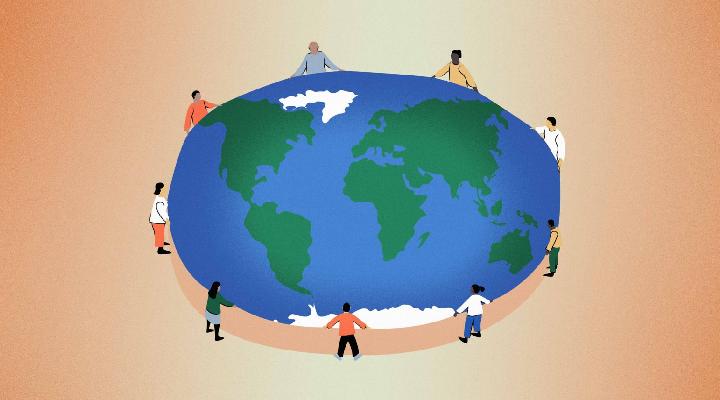How familiar are you with the concept of cosmopolitanism? Do you know what cosmopolitanism is? If you want to learn about new terms and their usage, this article is for you. This article explains everything you need to know about the patriotic world.
What is cosmopolitanism?
Cosmopolitanism, or a patriotic world, means humanity belongs to a single world community. This term consists of 2 Greek words:
- ” cosmos “ means “world”;
- ” polis “ is synonymous with “city.”
These two words together mean “global citizen.” The followers of this theory believe that every human being is a global citizen regardless of lineage and race.
The patriotic world is created by establishing a global government or, in simpler terms, by strengthening moral, economic, or political relations between nations and their citizens. A person who believes in the cosmopolitanism theory is called a “cosmopolitan.”
The background of the patriotic world
1. ancient era
The cosmopolitan theory dates back to 412 BC. At that time, Diogenes Sinopi, the founder of the Colbion School, answered the question, “Where are you from?” He said: “I am a citizen of the world.” Historians believe Diogenes only wanted to deny any obligation to his hometown, Sinope, and its citizens.
In the following century, cosmopolitanism became a positive concept thanks to the followers of the Stoic school. Zeno, the founder of this school, coined the term cosmopolitanism. The followers of this school believe that the world’s citizens are equal regardless of their ethnic and racial origins and social status. According to them, the main virtue of a human being is to serve others. For this, he must have political activities in the city where he lives or outside of it.
2. Middle ages
During this period, cosmopolitanism manifested in plans to create a universal monarchy or theocracy headed by the Pope. All the world’s Christians were united through faith and principles such as love for their neighbors.
In the 16th century, the patriotic world became a secular ideology, and the French Guillaume Postel proposed a universal government free of national, racial, and religious prejudices.
3. Enlightenment
During this period, international trade developed, and empires such as Britain and Russia were established. During this time, people traveled more and more. As a result, they became interested in the revival of ancient cultures such as ancient Greece, and theories related to altruism spread in societies.
German philosopher Immanuel Kant believed cosmopolitanism could help humanity end wars and achieve happiness. In an article he wrote in 1795 entitled “Perpetual Peace,” he mentioned the right of the patriotic world. Kant explained in this essay that the right of cosmopolitanism is the leading guide to protecting people from war.
In the 18th century, a global citizen welcomed anything new and was free from cultural, religious, and political prejudices. City dwellers who love to travel have created an international network and call any place their home “cosmopolitans.”
Voltaire, Denis Dido, David Hume, and Thomas Jefferson are among the famous cosmopolitans of the Enlightenment.
4. 19th and 20th century
Dietrich Hermann Hegwich, a German historian, became the founder of the patriotic economic world. According to him, the ideal world has no customs duties and restrictions on international trade. In this world, the market cares about people’s needs.
Leo Tolstoy is one of the most famous cosmopolitan missionaries at the end of the 19th century. This author was a pacifist. According to him, nationalism is the leading cause of wars and enmity between different groups.
In the 20th century, three major international organizations were formed based on the patriotic world theory:
- The League of Nations was formed in 1919 to ensure collective security and disarmament, resolve conflicts and improve the quality of life worldwide. This organization lasted until 1946.
- World Association of Nationalism: It was created in 1921 by a famous writer named Eugene Lanti. The members of this association wanted to destroy the concept of nationality in any form. This community was created to remove language barriers, and its members invented Esperanto.
- United Nations: It was created after the Second World War and is the largest organization that has existed until today.
Globalists in the 21st century

A modern cosmopolitan considers himself free from all territorial, cultural, and political boundaries and believes in the high values of freedom and equality for all citizens.
The satisfaction of the cosmopolitan individual is achieved when he strives for the benefit of the entire human race, not a particular nation. Such a person seeks to help others and support their rights and freedoms and likes to learn about other cultures.
Modern cosmopolitans favor free access to information and economic and political freedoms. They are eager to travel, learn different sciences and develop their business internationally.
Followers of the patriotic world theory believe that the world formed based on this theory consists of several states that use global and regional consensus to gain more bargaining power against opponents. These governments take advantage of the power of the main actors of civil society, such as Semans, to increase their legitimacy and attract the help of investors to pursue a global program. For example, governments leave such problems as global monitoring of human rights and environmental issues to non-governmental organizations such as “Amnesty International” or “Green Peace Organization,” which have a lot of public legitimacy.
What do cosmopolitan critics say?
Although the cosmopolitan theory has had its supporters since ancient times, it has always had its opponents. The most influential critics of this theory are those who believe in nationalism. Opponents criticize Jahanwantani for its disadvantages. According to this group of theorists, the most critical weaknesses of cosmopolitanism are:
- Contributing to the spread of cultural imperialism: According to this group, the patriotic world may sometimes promote Western or dominant culture. This can eventually lead to the extinction or marginalization of other cultures.
- Loss of identity: The emphasis on a global society may sometimes lead to the loss of individual or cultural identity, especially in marginalized communities.
- Promoting elitism: Sometimes cosmopolitanism is associated with elitism or a sense of self-righteousness among those who consider themselves global citizens.
- The impracticality of this theory: critics say this view is only an ideal philosophical theory. According to this group, this theory cannot be mentioned as a practical solution to global problems because it may not always be helpful and applicable in real-world situations.
Application of cosmopolitan theory in law science
We can see traces of this theory in some legal concepts and international declarations. The first example of applying this theory in the science of law goes back to the “Universal Declaration of Human Rights. ” This declaration was issued in 1948. In the Universal Declaration of Human Rights, the inalienable rights of every citizen in the world are recognized regardless of nationality, religion, culture, or other affiliations.
The concept of ” crime against humanity ” became an essential and agreed category in international law in response to crimes like the Holocaust. This shows the acceptance of each person’s responsibility towards the global community.
What is the difference between cosmopolitanism and globalization?
Globalization is the process of increasing solidarity among societies around the world. The term is often used to refer to the globalization of the economy and the integration of national economies into the global economy through trade, investment, and the free flow of capital. Also, this phenomenon is associated with increased cultural exchanges and the spread of new ideas and technologies beyond borders.
Sometimes globalization is confused with nationalism. The most important differences between these two concepts are:
- Globalization is mainly related to economic issues, but cosmopolitanism is a social or cultural phenomenon.
- The first concept emphasizes the solidarity of people and places, while cosmopolitanism focuses on cultural diversity and acceptance of other ideas.
- Globalization usually creates unity by making people and cultures more similar, but the national world leaves room for individual cultures and differences.
What is a global citizen passport, and how to get it?
In 1953, Gary Davis founded a non-profit organization called the World Service Organization. Ensuring free movement worldwide for cosmopolitans was one of the main goals of this organization. For this purpose, this organization issues the global citizen passport.
The global citizen passport is similar to the standard keys governments issue citizens. The holder’s personal information, such as name, date of birth, national number, and driver’s license number, is mentioned in this passport.
Everyone can get a global citizen passport. All you have to do is fill out the form for this passport on the World Services Organization website and pay for it. The cost of issuing this passport depends on its validity period. For example, for the validity of this passport for up to 3 years, you have to pay 75 dollars, and to get a global citizen passport with 15 years validity, they ask you for 500 dollars. It usually takes four months to issue this passport.
This passport gives the right to enter and exit some countries freely, the most important of which are:
- Burkina Faso;
- Zambia;
- Mauritania;
- Tanzania;
- Togo;
- Ecuador.
In some countries, this passport is used as one of the identity documents, but not everywhere. For example, this passport is not considered an official document in England or the United States.
This passport is symbolic. With the help of this passport, you only confirm that you are among the fans of the world. The most famous people who have taken this passport are Barack Obama, Oprah Winfrey, Patrick Stewart, and Edward Snowden.
you say
Cosmopolitanism emphasizes the solidarity of the world’s people regardless of their race, ethnicity, and religion. The followers of this theory believe that all people should have the same respect and attention irrespective of their affiliations.
To what extent do you think the patriotic world theory can help spread world peace? Do you agree with the supporters of this theory, or do you accept nationalism and the ideas that talk about the disadvantages of cosmopolitanism?



